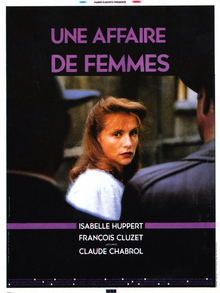Story of Women
This article needs additional citations for verification. (July 2022) |
| Story of Women | |
|---|---|
 Theatrical release poster | |
| French | Une affaire de femmes |
| Directed by | Claude Chabrol |
| Screenplay by |
|
| Based on | Une affaire de femmes by Francis Szpiner |
| Produced by | Marin Karmitz |
| Starring | |
| Cinematography | Jean Rabier |
| Edited by | Monique Fardoulis |
| Music by | Matthieu Chabrol |
Production companies |
|
| Distributed by | MK2 Diffusion |
Release dates |
|
Running time | 108 minutes |
| Country | France |
| Language | French |
Story of Women (
The film premiered at the
Plot
Under the German military administration in occupied France during World War II, Paul Latour is a prisoner of war in Germany and his wife Marie lives hand-to-mouth with their two children in a squalid flat. A neighbour, whose husband is also in Germany, has fallen pregnant and is trying to lose the baby. Marie helps her successfully. Other women come to her and she starts charging.
While talking with Paul following his release, she reveals that a fortune teller saw "nothing but good things" in her future, along with a lot of women, which she would not clarify. Marie confesses to wanting to be a famous singer. She has, however, lost her love for her husband, who has been wounded and struggles to stay in employment, and rejects his crude and abrupt sexual demands.
Although he cannot find work, he rents a bigger flat at her prompting. Marie continues her illicit business and lets prostitutes use their bedrooms during the day. When one of the abortions goes wrong, the woman dies and her despairing husband commits suicide. Marie shrugs off the tragedy and hires a maid to help. She visits a music teacher, who tells her that she has a great voice.
She also starts a daytime affair with a collaborator and offers the maid a pay raise if she sleeps with Paul. Paul is unhappy with this arrangement and, after he returns home early and witnesses Marie and her lover asleep together, he sends an anonymous denunciation to the police, alerting them to her illegal activities.
A recent law of the Vichy régime, determined to enforce morality and stop population decline, has made abortion a treasonable crime. Marie is condemned to death and guillotined.
Cast
- Isabelle Huppert as Marie
- François Cluzet as Paul
- Nils Tavernier as Lucien
- Marie Trintignant as Lulu/Lucie
- Dominique Blanc as Jasmine
- Franck de la Personneas Martinet
- Anna Mucha as Agnes [citation needed]
- Guillaume Foutrier as Pierrot #1
- Nicolas Foutrier as Pierrot #2
- Aurore Gauvin as Mouche #1
- Lolita Chammah as Mouche #2
- Thomas Chabrol as the waiter
- Fabienne Chaudat as the saleswoman
Awards
In 1988, Isabelle Huppert won the Best Actress award at the
See also
- Isabelle Huppert on screen and stage
- 1988 in film
- French films of 1988
References
- ^ "Ermanno Olmi Wins Prize At Venice Film Festival". New York Times. 10 September 1988. Retrieved 17 July 2013.
- ^ a b "Crix '89 Picks a Wide-Ranging Mix". Variety. 20 December 1989. p. 7.
External links
- Story of Women at IMDb
- Story of Women at AllMovie
